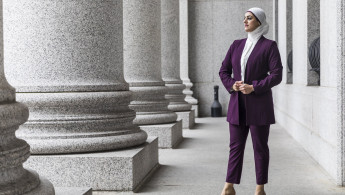Palestinian-American Tahanie Aboushi disrupts Manhattan's legal establishment in District Attorney campaign
Tahanie Aboushi had a typical New York City upbringing. As the daughter of Palestinian immigrants, she and her siblings helped at her family’s grocery store stocking shelves.
Then, when she was 14, her father was sent to 22 years in prison on charges of theft conspiracy. As her mother was thrust into a new life of single motherhood, the teenage Aboushi had a harsh lesson in America’s criminal justice system.
This led her to pursue a career as a civil rights attorney. But as time went on, her work opened her eyes to the power of the district attorney’s office, an institution whose policies she saw were causing harm to the kinds of people she had been representing – regular working New Yorkers, who often had the odds stacked against them.
At her law firm where she practices with her two of her siblings, she has represented black firefighters alleging discrimination against the New York Fire Department as well as a Black Lives Matter protester suing the New York Police Department for shoving her to the ground.
“As a civil rights attorney, for every family I’ve helped, thousands more have been destabilised by the decisions this [district attorney] office has made. This culminated in me looking through the cases,” Aboushi tells The New Arab.
"I dissect the harm that’s done. Instead, we can start having conversations beforehand that reduce the harm... We need to change the idea of what a prosecutor does"
“How much longer do we do damage control?” she asked herself. “This office has a lot of power.”
She wanted to be in a position where, as she puts it, she could help prevent the harm before it happened.
“As a civil rights attorney, I dissect the harm that’s done. Instead, we can start having conversations beforehand that reduce the harm. We need to change the idea of what a prosecutor does,” she says.
She would like to see a DA that will help improve the lives of everyday people, an important part of which would be increasing police accountability. She also thinks the DA’s office should take white collar crime more seriously. According to the Federal Bureau of Investigation, the annual cost of street crime is $15 billion compared to nearly $1 trillion for white-collar crime, which is rarely punished by prison time.
Manhattan’s outgoing DA, Cyrus Vance Jr., who announced in March that he would not be seeking another term, has been criticised for dropping high-profile cases, such as those of Harvey Weinstein and the two eldest Trump children, as well as for accepting a $10,000 campaign donation from the head of Donald Trump’s law firm.
His decision to retire comes at a time when New York City is facing a spike in crime after a year of pandemic lockdowns that has forced many out of work. It has also come at a time of growing conversations about race and wealth inequality, including questions about crackdowns on unpaid subway fares and long-time lax punishment of white-collar crime.
Running in a crowded field
By January 2020, Aboushi had already launched her campaign, and at the beginning of this year she held her volunteer launch, led by campaign manager Jamarah Hayner, having recently helped with the upset win of George Gascon for Los Angeles DA, beating incumbent Jackie Lacey. Aboushi will be competing in the June primary with eight Democratic contenders, most of whom appear to have progressive platforms per their profiles.
Can Aboushi break out of this crowded field before the November general election? An April internal poll by Tulchin Research has her tied at 11 percent for the lead with Tali Farhadian Weinstein, the most well-funded candidate, and considered the most conservative among the eight Democrats (57 percent said they were undecided).
A public poll last month by Benson Strategy Group found Weinstein in the lead at 16 percent, with Aboushi tied for fourth place at five percent (with 44 percent undecided). This has raised some concerns among progressives of a divided left.
So far, her run for DA has been well received by some important grassroots organisations, though still not enough to clear the crowded field of Democratic candidates. She has been endorsed by the Working Families Party, the Jewish Vote, the Muslim Democratic Club of New York, as well as Congress members Rashida Tlaib and Jamaal Bowman. She will likely need more similar endorsements to break out from the other contenders.
Working to win over sceptics
Running in Manhattan, a borough that’s nearly 90 percent Democratic means she doesn’t have to worry about appealing to conservative voters. Where she does have her work cut out for her in this campaign is convincing those who are sceptical of the possibility of a progressive DA.
“I think there are a lot of people who buckle to fear mongering, staying close to the ‘tough on crime’ mentality,” she says. “They’ll say you’ve never been a prosecutor. How can you do things better? We’ve only ever had prosecutors in this office. How have they done things?”
Aboushi says she welcomes the scepticism, which she sees as a sign that she’s pushing the envelope.
“Resistance is a sign of change. If people felt like things were staying the same, they should be concerned,” she says.
After a history of all white men in as Manhattan DA, many people see it as time for a new face to represent this diverse district.
As she continues on the campaign trail, the words of voters he has met along the way reminds her of why she got into the race.
“She’s one of us. She’s the real deal,” she has been told. “It gave me goosebumps. That’s it. We’ve been shut out, railroaded. We have to be seen.”
Brooke Anderson is The New Arab's correspondent in Washington D.C., covering US and international politics, business and culture
Follow her on Twitter: @Brookethenews


